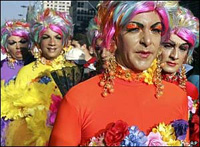Moscow court upholds city ban on gay parade, gay activists want to protest

Tverskoi District Court made the decision as Russian and foreign gay activists attended an unprecedented forum on gay rights in Russia.
Organizers for the conference had vowed to push forward with the parade on Saturday - the 13th anniversary of Russia's decision to decriminalize homosexuality - despite opposition from many members of Moscow's gay community as well as vehement protests and threats of violence from religious and extremist groups.
Nikolai Alexeyev, the main organizer for the parade, said activists would decide by Saturday whether to flout the ban.
City authorities cited the potential for violence as the primary reason for banning the parade - a decision criticized by European gay activists. A spokesman for the Tverskoi court said judges upheld the ban Friday, rejecting an appeal by parade organizers who had argued the ban was unconstitutional.
Mayor Yury Luzhkov said in a radio interview Friday that gay parades "may be acceptable for some kind of progressive, in some sense, countries in the West, but it is absolutely unacceptable for Moscow, for Russia."
The issue has split Moscow's gay community, many of whom say that Russian society is still too conservative, and that the parade will only provoke more violence from skinheads and radical groups.
On Thursday, protesters disrupted a speech by the grandson of the 19th century homosexual British writer Oscar Wilde, shouting nationalist slogans, throwing eggs and spraying an unknown gas, according to the AP.
British activist Peter Tatchell said that Russian gays and lesbians were deluded if they thought that only "quiet diplomacy" would improve the situation in Russia, which he described as a "climate of fear." He said the publicity surrounding the parade had provoked not only threats of violence but also a wider debate about gay rights in Russia.
Subscribe to Pravda.Ru Telegram channel, Facebook, RSS!




